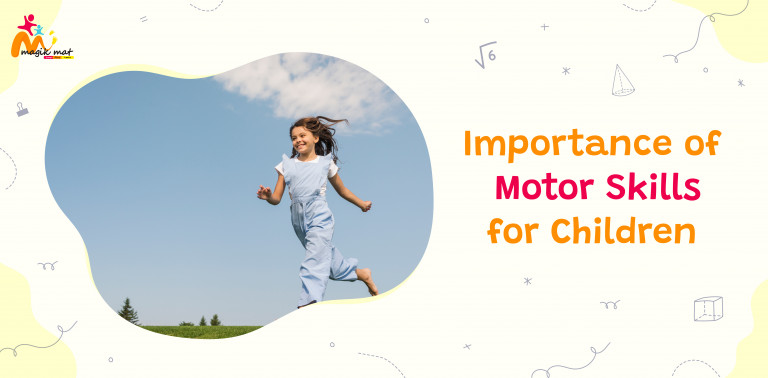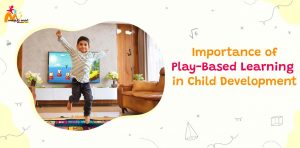Introduction
Have you ever wondered how children learn to grasp, crawl, and walk so easily? The answer lies in the development of motor skills, which play a crucial role in a child’s growth. From physical activities to cognitive and social growth, motor skills play a fundamental role in shaping a child’s life. But how do children acquire these essential skills? In this blog, we will discuss the importance of motor skills for children and ways to boost them.
What are Motor Skills?
The movements that our bodies make to perform everyday tasks such as lifting, moving, writing, and talking are referred to as motor skills. Motor skills require muscle, nerve, and brain coordination to perform physical activities successfully and efficiently. Motor skills develop from birth and continue through childhood and early adulthood.
Motor skills are broadly categorized into two types:
- Gross motor skills
- Fine motor skills
Gross motor skills
Gross motor skills require whole-body movement and the use of the body’s major muscles for performing common tasks such as standing, crawling, throwing, walking, running, jumping, and sitting. It makes extensive use of the muscles in the arms, legs, and chest. These skills are usually related to activities that require strength, balance, and coordination.
Examples of gross motor skills include throwing a ball, walking on the road, lifting a bucket, walking, running, jumping, hopping, climbing stairs or ladders, etc.
Fine motor skills
The ability to make movements with tiny muscles in the hands, wrists, and fingers is referred to as fine motor skills. A child who possesses these abilities can grasp, hold, grip, and squeeze anything. Fine motor skills assist children in learning how to care for themselves. Fine motor skills are used by children in many academic and daily life tasks.
Examples of fine motor skills include cursive handwriting, playing video games, using a keyboard, writing or drawing with a pencil, turning the pages of a book, etc.
Benefits of Motor Skills:
Physical Fitness
Motor skills involve physical activity, which adds to general fitness and wellness. Sports, dancing, and swimming are examples of activities that increase cardiovascular health, strengthen muscles and bones, and improve general physical well-being.
Emotional Control
Physical exercises that improve motor skills can have a beneficial impact on mental well-being. Endorphins, or “feel-good” hormones, are released during exercise, enhancing feelings of happiness and lowering stress, anxiety, and sadness. Furthermore, activities requiring motor skills can serve as outlets for emotional expression, assisting individuals in properly managing their emotions.
Coordination and Balance
Motor skills require a combination of sensory information as well as the coordination of various parts of the body. Motor skill development improves balance, hand-eye coordination, and spatial awareness. These skills are required for occupations that require precise movements, such as playing musical instruments, typing, or driving.
Social Interaction
Many activities that require motor skills, such as team sports or group dancing, develop social contact and cooperation. Such exercises can help to develop communication, teamwork, and social skills. It allows individuals to connect with others, build connections, and develop feelings of belonging.
Ways to Boost Motor Skills
Boosting a child’s motor skills is essential for their physical development and general well-being. Here are some ways to help them improve their motor skills:
Provide Educational Products
Educational products play a significant role in boosting motor skills in children through various engaging and interactive activities. These products often come with activities that require physical participation, like Magik Mat.
Magik Mat is an interactive educational product for children designed to encourage creativity, problem-solving, critical thinking, cognitive development, and physical activity. It provides a variety of activities focused on different learning styles, including numbers, alphabets, addition, subtraction, and quizzes. Furthermore, Magik Mat covers important social issues in order to develop responsible citizenship. This engaging learning product allows children to engage with games in a unique way, making it a perfect educational device with games of varying difficulty levels for customised learning.
Encourage Physical Activity
Encourage children to participate in physical activities such as running, jumping, climbing, and dancing. Give kids age-appropriate toys and equipment that encourage active play.
Puzzles
One of the best pastimes for children is to solve puzzles. They not only improve thinking skills and concentration span but also improve finger control. Provide children with puzzles that are suited for their developmental stage.
Coloring and DrawingDrawing using markers, crayons, coloured pencils, and chalk can help children strengthen their fine motor skills. Drawings are not required to be perfect, and scribbling is fine for developing fine motor skills.
Play with Musical Instruments
Playing musical instruments, such as a tiny piano, drums, or xylophone, teaches children how to coordinate their hands and eyes, move their fingers smoothly, and maintain time. It can also be a fun opportunity for them to practise using their muscles.
Importance of Motor Skills
Motor skills are essential for children’s development because they allow them to perform everyday tasks such as playing, feeding, and moving around. Gross motor skills depend on huge muscles to provide balance, coordination, reaction time, and physical power, allowing people to walk, run, and jump. These skills improve flexibility, hand-eye coordination, and muscle control, allowing children to execute required tasks. Practising these skills benefits general physical fitness, healthy growth, and cognitive processes by increasing brain development and problem-solving ability. Fine-motor skills, such as holding things and writing, improve flexibility and hand-eye coordination.
Conclusion
Motor skills are essential to the development of children. Motor skills are necessary for normal daily functioning, and they allow them to accomplish necessary tasks in daily life. Practising motor skills improves coordination, cognitive ability, and overall physical well-being, setting the groundwork for future learning and success.
Frequently Asked Questions
How to develop motor and fine skills for nursery kids?
To help kids in the nursery, you can do some easy things to improve their abilities. Allow kids to draw, cut, and construct using blocks to strengthen their motor skills. Encourage children to play outside so they can run, jump, and climb, which is beneficial to their health. Play ball games and puzzles with children that will help them learn to use their hands and eyes together. Allow children to touch and explore various materials with varying textures. Also, make sure the activities are enjoyable and appropriate for their age to help them grow and learn.
What are interesting games for kids’ fine motor skills?
Play Dough, puzzles, drawing, playing with sponges, board games, etc. are some of the interesting games for kids fine motor skills.
What are some motor skill-developing materials for kids?
Building blocks, art supplies, Shape sorters, kitchen sets, musical instruments, scooters, ride-on toys, etc. are some of the excellent motor skills-developing materials for kids. These materials promote creative and cognitive development while encouraging fine motor skills and hand-eye coordination.





